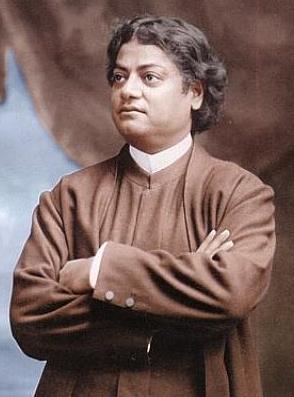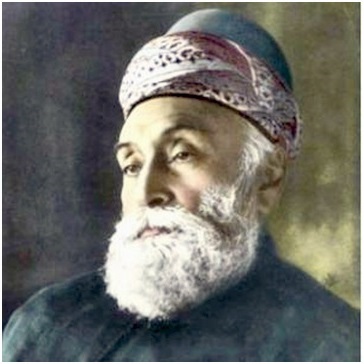Inspiration Behind the School of Mathematical Sciences
Swami Vivekananda and Jamshedji Tata:

More than a century back, Swami Vivekananda inspired Jamshedji Tata to establish centres for higher education and research, especially in the fundamental sciences. What is striking is that Jamshedji Tata offered the first directorship of such an institute to Swami Vivekananda. We quote below Jamshedji Tata’s letter to Swami Vivekananda:
“I very much recall at this moment your views on the growth of ascetic spirit in India, and the duty, not of destroying, but diverting it into useful channels. I recall these ideas in connection with my scheme of Research Institute of Science for India, which you have doubtless heard or read. It seems to me that no better use can be made of the ascetic spirit than the establishment of monasteries or residential halls for men dominated by this spirit where they should live with ordinary decency and devote their lives to the cultivation of sciences – natural and humanistic. I am of opinion that if such a crusade in favour of an asceticism of this kind were undertaken by a competent leader, it would greatly help asceticism, science, and the good name of our common country; and I know not who would make a more fitting general of such a campaign than Vivekananda.”
Although Swami Vivekananda’s response is not recorded, the Prabuddha Bharata, a monthly journal started by Swami Vivekananda as the official organ of Ramakrishna Mission, expressed its warm appreciation of the scheme in its editorial column of April 1899, during Swami Vivekananda’s lifetime, in the following words:

“We are not aware if any project at once so opportune and so far-reaching in its beneficent effects was ever mooted in India, as that of the Post-graduate Research University of Mr. Tata. The scheme grasps the vital point of weakness in our national well-being with a clearness of vision and tightness of grip, the masterliness of which is only equaled by the munificence of the gift with which it is ushered to the public. …Mr. Tata’s scheme paves the path of placing into the hands of Indians this knowledge of Nature — the preserver and the destroyer,… — that by having the knowledge, they might have power over her and be successful in the struggle for existence. …We repeat: No idea more potent for good to the whole nation has seen the light of day in Modern India. Let the whole nation therefore, forgetful of class or sect interests, join in making it a success. “
Two of India’s premier institutions dedicated to fundamental science research, namely, Tata Institute of Fundamental Research and Indian Institute of Science, bear testimony to this inspiration, both in terms of the excellence of the academic programme, as well as in terms of the quality of research. The time is now ripe for the Ramakrishna Mission, which has matured in its service activities over the past century, to directly step into the field of higher education and research, to contribute to actualizing Swami Vivekananda’s vision.
Objectives of the School
The School of Mathematical Sciences aims at integrating teaching with research under the same umbrella. Teaching and research have unfortunately become distanced from each other in post-independent India. To form a bridge between the two is the principal objective of our efforts. This is to ensure two things:
- Undergraduate students get exposed to research from the beginning of their career. Teachers often serve as role models for students. A motivated researcher-cum-teacher can serve this purpose best.
- Research institutions need students who are motivated and aware of current research. There is a severe lack of such students in the fundamental sciences today in India. A programme that fills this gap will thus be fulfilling a national need in developing technically qualified scientific manpower.
We thus hope to address, in some measure, the following issues, that Indian science in general is facing at present:
- A lack of a scientific middle class. What this means is that certain individuals through self-effort, do attain to a certain excellence. However, they form a small minority. Science education in its higher reaches is plagued by the lack of a system to bring larger numbers of students up to par with centres of excellence abroad. Thus, while India does have a potential for excellence in terms of bright youngsters, this does not translate into a manifestation of excellence due to lack of institutions that can tap this talent and bring it to fruition.
- Quality of research, still remains below par, compared to many other countries. Here quality is to be evaluated roughly in terms of peer review, publications in reputed journals and citations. This, again, is not due to lack of talent. Indian researchers abroad seem to be doing rather well. However, the research atmosphere within the country, still needs to develop and meet international standards.
Given the national situation today, it is therefore imperative that students grow up with a hunger for knowledge per se, so that they may take up the responsibility of education for their own advancement and for the good of all. Such a goal can only be achieved if time-honoured and time-tested disciplines are actively encouraged to grow and flourish and finally train our students in developing the required skills.
We would also like to ensure that the faculty impart the knowledge they gain to students, so as to ensure the sustained growth of an academic and intellectual culture.
About the School
At present the School of Mathematical Sciences consists of three departments functioning in the Belur campus of RKMVERI – the Departments of Computer Science (CS), Mathematics and Physics. The departments are all housed in the Mathematical Sciences wing of Prajna Bhavan, the academic complex in the Belur campus. All departments feature faculty who are active in research involving national and international collaborations. Each of the departments offer Masters and PhD programmes.
Excerpts from National Knowledge Commission (2005-2008) Report
The considerations above only bear out the National Knowledge Commission recommendations. We quote the relevant passages from the NKC Note on Higher Education:
“There is, in fact, a quiet crisis in higher education in India that runs deep. It is not yet discernible simply because there are pockets of excellence, an enormous reservoir of talented young people and an intense competition in the admissions process…..the following problems are common enough (across disciplines) to be a cause for concern. First, curricula, which have remained almost unchanged for decades, have not kept pace with the times, let alone with the extending frontiers of knowledge. Second, learning and creativity are at a discount in a system of assessment that places a premium on memory rather than understanding…..Seventh, the importance attached to research has eroded steadily over time. Eighth, the volume of research in terms of frequency of publication and the quality of research reflected in the frequency of citation or the place of publication, on balance, is simply not what it used to be.”
To address these critical issues, the NKC has suggested the following (again extracted from the NKC Note on Higher Education):
“The syllabi of courses in universities, which remain unchanged for decades, need to be upgraded constantly and revised frequently. The laws of inertia reinforced by resistance to change must be overcome. Universities should be required to revise or restructure curricula at least once in three years. Analytical abilities and creative thinking should be at a premium. Learning by rote should be at a discount.
Research: We attempted to create stand-alone research institutions, pampered with resources, in the belief that research should be moved out of universities. In the process, we forgot an essential principle. There are synergies between teaching and research that enrich each other. And it is universities which are the natural home for research. What is more, for universities, research is essential in the pursuit of academic excellence. It is time to reverse what happened in the past and make universities the hub of research once again.
Competition: The supply constraint on higher education is an impediment to accountability. When students have relatively few choices, institutions have greater power over them. An expansion of higher education which provides students with choices and creates competition between institutions is going to be vital in enhancing accountability.”
The National Government has already taken note of these problems and the setting up of Indian Institutes of Science Education and Research (IISERs) and National Institutes of Science Education and Research (NISERs), as well as the present national emphasis on Education in general and Higher Education in particular indicate the commitment of the Government to the cause. Several research institutes – Tata Institute of Fundamental Research (TIFR), Institute of Mathematical Sciences (IMSc), Indian Statistical Institute (ISI), Indian Institute of Science (IISc), Harish Chandra Research Institute (HRI), Chennai Mathematical Institute (CMI) amongst them – have enriched their programmes by starting undergraduate and teaching programmes to address these issues.